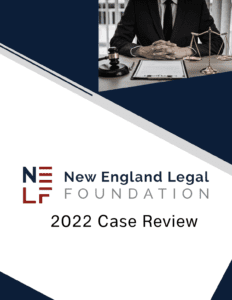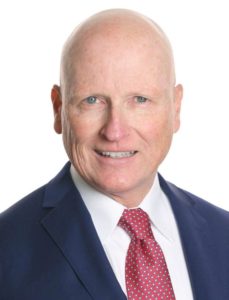Terrence Marengi v. 6 Forest Road, LLC et al.
Massachusetts Supreme Judicial Court
The question posed in this case is whether a court may require a bond from a plaintiff who appeals the approval of a comprehensive permit issued under G.L. c. 40B to build affordable housing. NELF argued that a bond may be required even though the bond statute does not actually mention the approval of c.40B permits as such. NELF reasoned that “site plan” approvals are included expressly in the bond statute and since c. 40B permits always require approval of a site plan, they too are within the scope of the bond statute. On December 14, the Massachusetts SJC issued a decision confirming that appeals from affordable housing comprehensive performs may require a bond (as NELF had argued).
The ERISA Industry Committee v. City of Seattle
U.S. Supreme Court
NELF urged the Supreme Court to grant certiorari in this case in which Seattle attempted to circumvent ERISA preemption law by requiring employers to alter the terms of their ERISA plans, create a plan, or make cash payments directly to employees in lieu of a plan. NELF argued that the lower courts erred in upholding the ordinance because they relied on the “presumption against preemption,” which does not apply when there is an express statutory preemption clause, as here. In November 2022, the Court denied cert.
Nieveen v. TAX 106 and Lancaster County, Nebraska
U.S. Supreme Court
This is one of three petitions before the Supreme Court on the same important property rights issue: Does government violate the Takings Clause when it seizes real property for overdue taxes, sells it, and refuses to turn over surplus sale proceeds to the owner? The Nebraska courts refused to recognize that the owner has a property interest in the money. In support of her petition, NELF traced the historical common law of property seizures used to pay taxes and of land sales used to pay debts. NELF also traced the origin of “equity” as a property interest and why it entitles a taxpayer to compensation for any “equity” lost in a tax seizure even when there is no sale.
Brown et al. v. Saint-Gobain Performance Plastics Corp. et al.
New Hampshire Supreme Court
Residents of New Hampshire who were exposed to a toxic chemical called PFOA have sued a plastics company for the costs of being medically monitored for any symptoms that might result from the exposure. Because of the novelty of the claim, NELF filed a brief arguing that a New Hampshire court’s power to deal with such a major question of public policy is circumscribed by that state’s strong tradition of judicial deference to the legislature on public policy. Deference is all the more warranted here, NELF pointed out, because the legislature has recently been engaged in trying to reach a consensus on the issues raised in this case. The case was recently argued and decision is pending.
Koussa v. Attorney General and Secretary of the Commonwealth
Massachusetts Supreme Judicial Court
In this case NELF argued that two popular initiative questions were correctly certified by the Attorney General for appearance on the 2022 ballot. The initiatives were similar in that they both would have recognized Lyft and Uber drivers to be independent contractors, not employees and would have entitled them to certain benefits from the companies. NELF argued that the numerous provisions found in the initiatives, though ranging widely, did not violate the state constitution’s “relatedness” requirement because they were all necessary to define an entirely new form of employment relationship. In June 2022, the SJC, finding that two parts of the initiatives were extraneous to that purpose, prohibited the questions from being placed on the ballot.
Anderson v. Healey
Massachusetts Supreme Judicial Court
In this case the legislature sought to place on the ballot a constitutional amendment that would create the first-ever exception to the state’s flat tax. NELF argued that the summary prepared for the ballot by the Attorney General would be highly misleading to voters concerning how the new revenue is to be spent. NELF recounted the history of how the proposal’s supporters, in and out of the legislature, long sought to obscure what effect the new revenue would actually have on its two supposed beneficiaries, public transportation and education. In its June 2022 decision, the SJC ruled that the summary was unobjectionable because it accurately tracked the language of the proposed amendment.
Biogen International GMBH v. Mylan Pharmaceuticals Inc.
U.S. Supreme Court
The question posed in this petition concerned 35 U.S.C. §112’s requirement that an inventor provide a “written description of the invention” in order to secure a patent. The Federal Circuit ruled that Biogen’s dosage disclosures for a new drug called dimethyl fumarate were insufficient. In its amicus brief, NELF argued that the Federal Circuit’s decision confounded the three separate disclosure requirements set forth in 35 U.S.C.
§112(a): the written disclosure requirement, the enablement requirement, and arguably the best mode requirement. On October 3, 2022, the Court denied the petition.
Reagan v. Commissioner of Revenue
Massachusetts Supreme Judicial Court
The SJC requested amicus briefing on whether the sale of a G. L. c. 121A urban redevelopment project creates a capital gains income tax liability. The Commissioner ruled that while such a “project” is exempt from taxation, the sale of it is not, and the Appellate Tax Board agreed. NELF argues that the exemption on its face is a broad one, and that the Commissioner’s narrow reading both ignores the plain language of the statute and conflates it improperly with another statute. NELF also discusses the harmful practical effects of the Commissioner’s ruling would have urban redevelopment.



